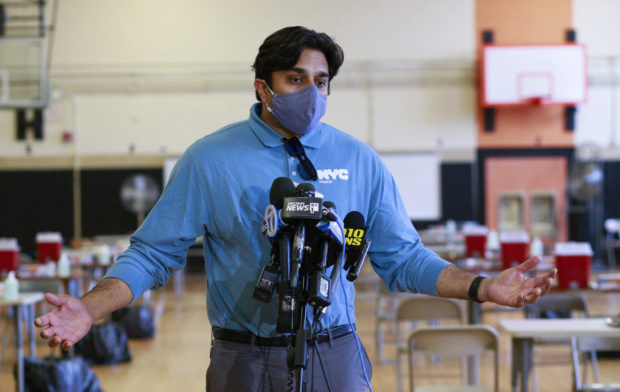New York asks WHO to re-name ‘stigmatizing’ monkeypox

New York City health commissioner Ashwin Vasan speaks to members of the media during a press conference before the opening of a Monkeypox mass vaccination site at the Bushwick Education Campus in Brooklyn on July 17, 2022 in New York City. AFP
NEW YORK — New York City asked the World Health Organization (WHO) on Tuesday to rename the monkeypox virus to avoid stigmatizing patients who might then hold off on seeking care.
New York has seen more cases of the disease, which the WHO declared a global health emergency over the weekend, than any other city in the United States, with 1,092 infections detected so far.
“We have a growing concern for the potentially devastating and stigmatizing effects that the messaging around the ‘monkeypox’ virus can have on… already vulnerable communities,” New York City public health commissioner Ashwin Vasan said in a letter to WHO chief Tedros Adhanom Ghebreyesus dated Tuesday.
The WHO had floated the idea of changing the name of the virus, which is related to the eradicated smallpox virus, during a press conference last month, a proposal Vasan mentioned in his letter.
Vasan referenced the “painful and racist history within which terminology like (monkeypox) is rooted for communities of color.”
He pointed to the fact that monkeypox did not actually originate in primates, as the name might suggest, and recalled the negative effects of misinformation during the early days of the HIV epidemic and the racism faced by Asian communities that was exacerbated by former president Donald Trump calling Covid-19 the “China virus.”
“Continuing to use the term ‘monkeypox’ to describe the current outbreak may reignite these traumatic feelings of racism and stigma — particularly for Black people and other people of color, as well as members of the LGBTQIA+ communities, and it is possible that they may avoid engaging in vital health care services because of it,” Vasan said.
Anyone is susceptible to contracting monkeypox, which has long been endemic in Central and Western Africa, but so far its spread in Europe and the United States has been mostly concentrated among men who have sex with other men.
The first symptoms can include a fever and fatigue, followed a few days later by a rash that can turn into painful, fluid-filled skin lesions, which may last for a few weeks before turning into scabs that then fall off.
No deaths have been reported so far in Europe or the United States.
More than 16,000 confirmed cases have been recorded in 75 countries so far this year, the WHO said on Monday.
A limited number of doses of a smallpox vaccine found to protect against monkeypox, called Jynneos, have been administered in New York, mostly to gay and bisexual men.
RELATED STORIES
Explainer: How worried should we be about the monkeypox global health emergency?
WHO declares global health emergency over monkeypox outbreak
Monkeypox outbreak constitutes global health emergency – WHO